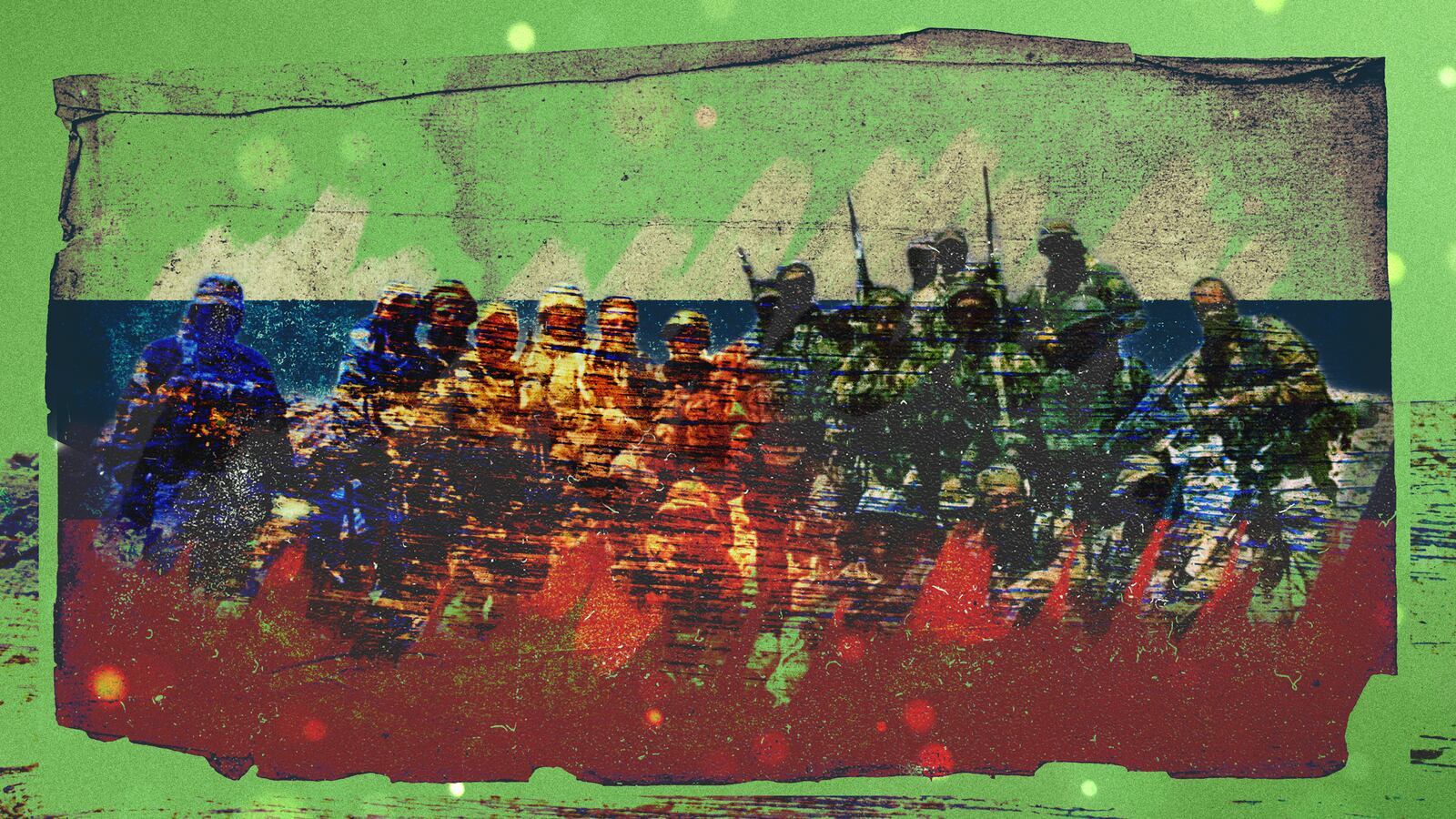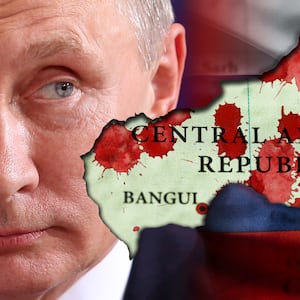One of the most influential and hostile critics of the infamous Wagner Group—sometimes known as Putin’s private army—died in suspicious circumstances earlier this year. Three sources close to him have told The Daily Beast that they believe he was poisoned.
Two friends and a relative of Jean Sinclair Maka Gbossokotto say the late journalist told associates he was meeting with an unnamed individual connected to both the Central African Republic (CAR) government and the Wagner Group at a restaurant in the hours before he died.
“The person he had dinner with is someone very close to the Russians,” one of Gbossokotto’s closest friends told The Daily Beast. He was speaking on condition of anonymity as he fears he could be targeted by the Russians. “His wife who was with him when he died said at first he complained of feeling extremely weak and felt like vomiting, and later he began to convulse, with frothy saliva gushing out of his mouth.”
He said Gbossokotto was out until just before midnight in the capital Bangui, which alarmed his partner who was worried about his safety. Within hours of returning home, he was taken extremely ill in the early hours of Feb. 23. By the time he arrived at a local hospital he was pronounced dead.
“Jean was definitely poisoned,” said the late journalist’s friend.
All three sources confirmed that the journalist’s family was told by the hospital that his death was officially listed as cardiac or respiratory arrest, but they are convinced that the journalist was poisoned by someone close to those he often targeted in his publications.
Gbossokotto had become a thorn in the side of both the CAR government and Russian Wagner mercenaries, who’ve been in CAR for four years—following an invitation by the government to help fight rebels and secure the country’s gold mines. Putin’s private army, which is reportedly run by Yvegeny Prigozhin, is accused of carrying out a host of barbaric acts in the impoverished African nation.
In 2019, the journalist founded Anti Intox RCA, a local fact-checking website that countered disinformation, some of which emanated from Russian-backed trolls. He used the website, which says its mission is “to become the arbiters of the truth,” to point out Russian excesses in CAR, and got involved in movements to eradicate fake news.
At the time of his death, Gbossokotto was a member of the Stop the On-dits (rumors) campaign spearheaded by Radio Ndeke Luka and the Fondation Hirondelle, a Swiss non-profit organization which provides media training and solutions in crisis areas. The respected journalist was also a coordinator of the Consortium of Journalists Against Disinformation, and the founder of a project called Together Let’s Save Democracy Against Misinformation.
Gbossokotto took his campaign to the streets in 2020, just after Facebook reported that it had suspended accounts in CAR and a number of other African countries connected to “entities associated with Russian financier Yevgeniy Prigozhin.” He held events in Bangui along with like-minded colleagues to dispel the rumors and fake news that were spreading through social media and instant messaging apps, often disseminated by Russian trolls. His popularity in the country began to grow from there.
In February, shortly before he died, Gbossokotto became extremely critical of the Wagner Group. In a dispatch on Valentine's Day, he said that he had become aware of “cases of very unorthodox abuse” committed by Wagner mercenaries on CAR forces and, in another article on the same day, he hailed a high-ranking police officer for having the courage “to denounce loud and clear the abuse he suffered at the hands of the Russian paramilitaries of the Wagner company.” He went on to criticize the CAR government for failing to call the Russians to order and accused Wagner mercenaries of throwing Central Africans into “slavery.”
On the eve of Gbossokotto’s death, his website posted an article that criticized the CAR government for arresting four French soldiers who were accused of attempting to assassinate the president and claimed that Russian-backed troll factories were created “with the aim of tarnishing the image of France.” Hours after the article was published, Gbossokotto’s friends say he had dinner with the individual linked to the Russians and the following morning, the journalist was dead.
“The invitation [to the dinner meeting] came suddenly and was urgent, so Jean didn’t have time to explain to anyone in detail who he was going to meet,” another friend and colleague of the journalist who worked closely with him told The Daily Beast privately. “But I do know he was meeting with someone who was close to the Russians and wanted to talk about their operations in the country.”
Gbossokotto, according to his colleague, had also received phone calls from several people warning him to stop targeting the CAR government and Russian paramilitaries in his publications, a situation that made the late journalist “uncomfortable.”
“There was a time when a government official called to say he was not happy with Jean over an article he wrote about the current administration and the Wagner Group,” said the late journalist’s colleague, who added that Gbossokotto had received warnings from “so many people” that “he began to fear for his life.”
A funeral for Gbossokotto was not held until April, close to two months after he had died. No autopsy was carried out on his body. A relative of the journalist told The Daily Beast that the government agreed to release his body only after officials were convinced his family wouldn’t carry out an autopsy to ascertain the actual cause of his death.
“The fact that the government didn’t want an autopsy shows it has something to hide,” said a relative of Gbossokotto, who didn’t want his name mentioned so as not to be targeted. “All we know is that Jean was poisoned and someone in the government or among the Russians knows something about it.”
No government official has made a statement on Gbossokotto’s death. The Daily Beast reached out to the CAR Ministry of Communication and Media, but emails sent to the ministry’s spokesperson received no response by the time of publication.
Gbossokotto’s partner, Cathia Préfina Okoyo, and his father, Maka Gbossoko, have chosen not to speak to the media since his death.
The death of Gbossokotto isn’t the first time a journalist in CAR has been killed after investigating the activities of the Wagner Group. In July 2018, three Russian journalists—Orkhan Dzhemal, Alexander Rastorguyev, and Kirill Radchenko—were murdered as they attempted to get to Bambari to look into the activities of the Wagner Group. About two months after the killings, Louis Kottoy, a freelance journalist who had been investigating the death of the Russian journalists, was severely beaten in Bangui by three gun-wielding men who took away his phone and laptop and left him with a dislocated left shoulder and a cut above his right eye that required three stitches. The Daily Beast has previously reported how Sylvain Onana, a journalist in CAR who went to neighborhoods close to a gold mine to dig into reports about Russian harassment of locals in the area, was accosted by Wagner mercenaries who seized his phone and camera, and warned him never to return to the area.
Following widespread belief that Gbossokotto was killed, many have become concerned about the safety of media practitioners in the country, especially those who report on the Wagner Group. Journalists in CAR who are scared of being targeted are now shying away from holding the mercenary group to account.
“No one wants to be killed,” said Onana, who has avoided reporting on the Wagner Group since being threatened by Russian mercenaries in the town of Bambari in October, 2020. He told The Daily Beast: “For journalists here in CAR, either you criticize Wagner and get killed, or you avoid them and stay alive.”






